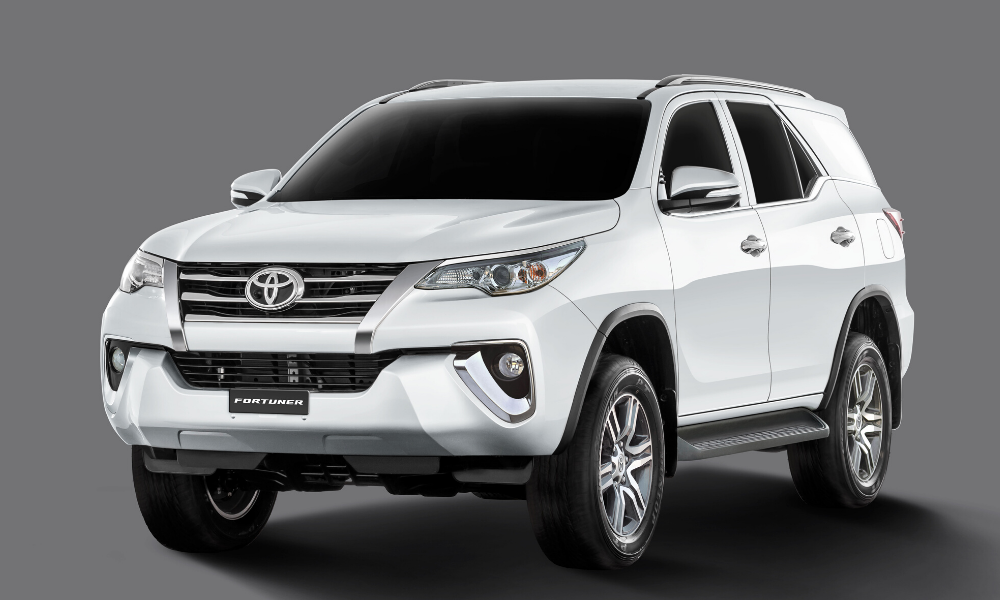Toyota rings in 2020 with a brand new SUV, the Fortuner G
Toyota marks a decade of Fortuner in Pakistan by introducing a more affordable trim level. Now starting at Rs7.29million, the new G-trim slots right under the currently available Fortuner V.

What's new with the G?
Under the hood
Fortuner G retains the tried and tested 2.7-litre engine of the V.
The updated line-up now offers consumers two trim-levels, i.e., G and V, that share the same 2.7-litre gasoline engine mated to a 6-speed automatic transmission sending power across two of their four wheels.
These 4x2 variants are then topped off by a 4x4 diesel monikered 'Sigma 4.'
Also read: Meet the new Toyota Fortuner Sigma-4 on a thrilling obstacle course
Exterior
The overall front lighting sees an overhaul in the G-trim. Alongside it also has 17-inch alloy wheels compared to the 18 inches on the V.
Sharing its underpinnings with Fortuner V, it comes as no surprise that the new G-trim only sets itself apart cosmetically.
Case in point, the side profile of the G sees a reduction in its rim size by an inch, giving it a revised stance. At the front, it drops LED head and fog lamps in favour of more traditional halogen bulbs to lend it a warmish hue at night.
The rear, however, remains cosmetically similar to the V except for the emblem that specifies its trim.
Interior

Stepping inside, though, reveals more profound differences between the G and V.
For instance, the change of upholstery from leather to fabric can quite well be felt through the seams of the seats and weaves of the door trims. This material change, therefore, allows the G to have a more breathable interior – conceivably making the seats feel less like a stove on a hot summer afternoon.
Nonetheless, the absence of leather from the cabin does make the G feel more modest than its siblings.
That relatively modest character of the G, however, is long gone, when speaking of its convenience features, as it retains most of what has been on offer in the 'V.'
The more rudimentary functions such as retractable mirrors, push start mechanism, and the automatic climate control system are all still there on the 'G.'
Similarly, it keeps the same 8-inch 6-speaker infotainment system on the dash, multi-information display (MID) in the speedometer, and switches on the steering wheel.
Unlike 'V,' you wouldn't, however, be able to adjust the driver seat electronically as those controls now come mechanical as standard on the Fortuner G.
Moreover, passengers should expect a similar level of utility and comfort from the G as it continues to provide three 12V DC connectors and one 220V AC socket to power multiple devices on the go.

The Fortuner offers a greater deal of overall practicality by providing a third row to seat a total of seven passengers.
The model comes with both a front AC and a rear AC, which is spread across the two rows at the back. Thus, occupants at the back can also expect to remain 'cool' during their long commute as Fortuner G provides ventilation across all three rows.
Fortunately, Toyota has also kept itself from cutting corners of the onboard safety equipment on the G-trim as it continues to offer both driver and passenger airbags with added protection for their knees.
Vehicle Stability Control (VSC) also comes standard across the entire Fortuner range.
Speaking of going offroad, the body-on-frame technique separates a relatively rigid chassis from the body to improve the car's ability to withstand twisting forces significantly. This is in contrast to the other offerings in the market, that claim to be an SUV but are based on a monocoque design which is typically used in sedans.
Final word
To conclude, we are conditioned to accept that a base-level trim and a reduced entry price-point could indicate a significant toll on a car's utility and convenience. The new G-trim of the Fortuner, however, seems to suggest otherwise.
It retains what has already been celebrated on the V and cuts corners where cosmetic and practical consequences are hard to notice. This, in effect, further consolidates Fortuner's stance as Pakistan's only domestically assembled SUV before heading into another decade in its market.
This content has been independently produced by the writer and Dawn.com. Indus Motor Company has paid for association with the content.


